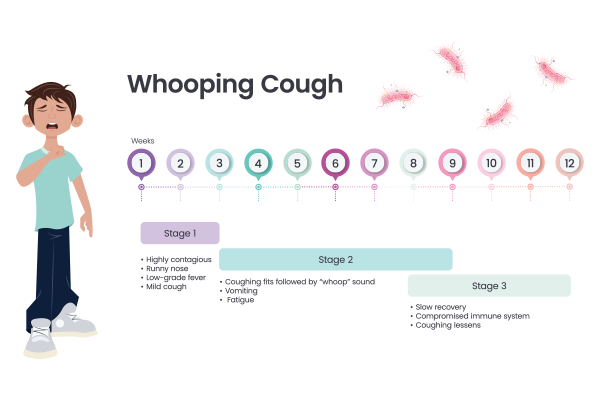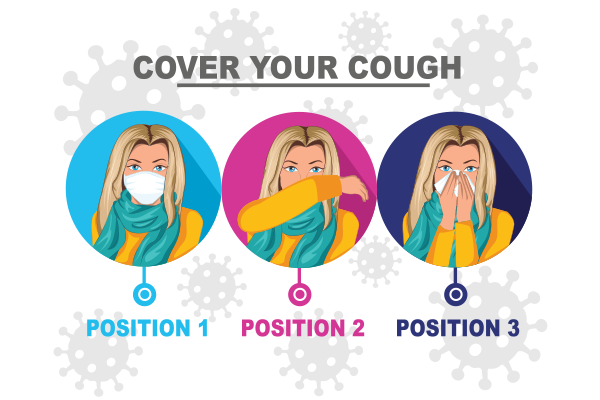
Whooping cough, also known as pertussis, is a highly contagious respiratory infection caused by the bacterium Bordetella pertussis. Although it might start with symptoms resembling a common cold, it can progress into severe coughing fits that produce a distinctive "whoop" sound during inhalation. Understanding whooping cough symptoms, treatment options, and prevention strategies is vital for keeping yourself and your loved ones healthy.
Synopsis
- What is Whooping Cough?
- Causes of Whooping Cough
- How is Whooping Cough Spread?
- Whooping Cough Symptoms: Early Detection is Key
- Who is at Risk of Whooping Cough?
- Why is it Called Whooping Cough?
- Diagnosing Whooping Cough
- Whooping Cough Treatment: Managing the Infection
- Preventing Whooping Cough: Vaccination is Key
- Additional Prevention Tips
- Complications of Whooping Cough
- Why is Whooping Cough Making a Comeback?
- Myths vs. Facts About Whooping Cough
- Conclusion
What is Whooping Cough?
Whooping cough is a bacterial infection that affects the respiratory tract. It spreads through droplets in the air when an infected person coughs, sneezes, or talks. Despite advances in medicine and vaccination programs, pertussis remains a global health concern, particularly for infants, unvaccinated individuals, and those with compromised immune systems.

Causes of Whooping Cough
The primary cause of whooping cough is the bacterium Bordetella pertussis. Once inside the respiratory tract, the bacteria attach to the lining of the airways and release toxins that damage the tissues. This leads to inflammation and the hallmark symptom—uncontrollable coughing.
How is Whooping Cough Spread?
Whooping cough spreads easily from person to person. The infection is most contagious during the early stages, often before severe symptoms develop. This makes it critical to identify and isolate cases early to prevent further transmission.
Whooping Cough Symptoms: Early Detection is Key
Whooping cough symptoms typically develop in three stages:
1. Catarrhal Stage (1-2 weeks):
-
Mild coughing
-
Runny nose
-
Low-grade fever
-
General fatigue
2. Paroxysmal Stage (2-8 weeks):
-
Intense coughing fits that end with a "whoop" sound
-
Vomiting after coughing spells
-
Red or bluish face during coughing episodes
3. Convalescent Stage (Weeks to months):
-
A gradual reduction in the severity and frequency of coughing spells
Infants may not exhibit the classic "whoop" sound but can experience life-threatening complications such as pauses in breathing (apnea) or severe difficulty breathing. Recognizing these symptoms early is critical to preventing complications.
Who is at Risk of Whooping Cough?
Certain groups are more vulnerable to whooping cough:
-
Infants and young children: Newborns under six months are particularly at risk since they are not fully vaccinated.
-
Unvaccinated individuals: Those who have not received their DTaP (diphtheria, tetanus, and acellular pertussis) or Tdap booster are at higher risk.
-
Elderly individuals: Older adults with weakened immune systems are also susceptible.
-
Pregnant women: Pregnant individuals can pass the infection to their newborns if they are not immunized.
Why is it Called Whooping Cough?
The term "whooping cough" comes from the distinctive "whoop" sound that occurs when a person breathes in after a severe coughing fit. This sound is caused by the inflamed airways struggling to bring in air after being blocked during prolonged coughing.
Diagnosing Whooping Cough
If whooping cough is suspected, a healthcare provider may perform tests such as:
-
A nasal or throat swab to detect Bordetella pertussis
-
Blood tests to assess white blood cell counts
-
Chest X-rays to rule out complications like pneumonia
Whooping Cough Treatment: Managing the Infection
Early treatment is crucial for reducing the severity and spread of whooping cough. Here are the main components of whooping cough treatment:
1. Antibiotics:
Antibiotics like azithromycin, erythromycin, or clarithromycin are prescribed to eliminate the bacteria and prevent transmission to others.
2. Supportive Care:
-
Rest and hydration are essential to recovery.
-
Use a humidifier to ease breathing and soothe irritated airways.
-
Over-the-counter medications can help alleviate mild symptoms like fever, but consult a doctor before giving any medication to infants.
3. Hospitalization:
In severe cases, especially for infants, hospitalization may be required to monitor breathing and provide oxygen therapy.
More Reads: Learn More About Infectious Disease
Preventing Whooping Cough: Vaccination is Key
Vaccination is the most effective way to prevent whooping cough. Here’s how:
1. Childhood Vaccination:
-
Children should receive the DTaP vaccine at 2, 4, 6, and 15-18 months, with a booster dose at 4-6 years.
2. Booster Shots for Teens and Adults:
-
The Tdap booster is recommended for preteens (11-12 years) and adults who missed earlier doses.
3. Vaccination During Pregnancy:
-
Pregnant women should receive a Tdap booster during the third trimester of every pregnancy to protect their newborns.
4. Herd Immunity:
-
Widespread vaccination helps protect those who cannot be vaccinated, such as infants and individuals with medical contraindications.
Additional Prevention Tips
-
Practice Good Hygiene: Wash your hands frequently and cover your mouth when coughing or sneezing.
-
Avoid Close Contact: Stay away from individuals with cold-like symptoms or severe coughing fits.
-
Stay Informed: Keep up-to-date with vaccination schedules and local health advisories.

Complications of Whooping Cough
Without proper treatment, whooping cough can lead to serious complications, including:
-
Pneumonia
-
Dehydration
-
Weight loss due to vomiting
-
Seizures
-
Brain damage from lack of oxygen during coughing fits (in rare cases)
Infants are particularly vulnerable to these complications, making early diagnosis and treatment crucial.
Why is Whooping Cough Making a Comeback?
Despite vaccination efforts, pertussis cases have been rising in some regions. Possible reasons include:
-
Waning immunity from vaccines over time
-
Vaccine hesitancy and misinformation
-
Improved detection and reporting
Myths vs. Facts About Whooping Cough
|
Myth |
Fact |
|
Whooping cough only affects children |
While children are at higher risk, adults can also contract and spread pertussis |
|
Vaccination guarantees complete protection |
Vaccines significantly reduce the risk but may not provide lifelong immunity. Booster shots are essential |
|
Antibiotics always cure whooping cough instantly |
Antibiotics can prevent the spread of infection but may not immediately stop the symptoms, especially in the later stages |
Conclusion
Whooping cough is a preventable yet serious disease that requires vigilance and proactive measures to combat. Understanding the causes, recognizing the symptoms, and adhering to vaccination schedules can help reduce the impact of pertussis in communities. By spreading awareness about whooping cough symptoms, treatment options, and prevention strategies, we can collectively work toward healthier, safer lives.
Stay informed, stay vaccinated, and help protect those who are most vulnerable. Together, we can limit the spread of whooping cough and ensure a healthier future for everyone.
For expert care and comprehensive treatment, trust Manipal Hospitals Jaipur, a leading name in healthcare. Their experienced team of specialists is dedicated to providing advanced care for respiratory infections like whooping cough. Book an appointment today to safeguard your health and well-being!
FAQ's
Whooping cough can last up to 10 weeks or longer, earning it the nickname "the 100-day cough." The duration varies depending on the individual and the timeliness of treatment.
Yes, immunity from the vaccine wanes over time, making booster shots essential for adults to stay protected.
Whooping cough can be dangerous for pregnant women and their unborn babies. Vaccination during the third trimester protects both the mother and the baby after birth.
While rare, it is possible to get whooping cough more than once. Immunity after infection or vaccination can decrease over time.
If you suspect whooping cough, consult a healthcare provider immediately for diagnosis and treatment. Isolate the person to prevent spreading the infection to others.



















 6 Min Read
6 Min Read












